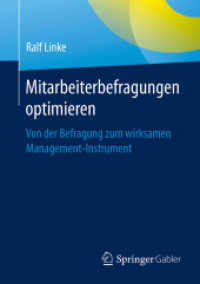Full Description
Decolonizing Ebola Rhetorics Following the 2013-2016 West African Ebola Outbreak defends the position that, despite the supposed "lessons" that have been learned about the spread of Ebola Virus Disease (EVD) after the 2013-2016 West African Ebola outbreak, there remains a need to "decolonize" the rhetorics of Ebola prevention and containment. The author asserts that the failure of governments, aid organizations, and global media to confront the structural and material legacies of colonialism in West Africa will prevent global communities from adequately dealing with sporadic Ebola outbreaks. Central to the book's argument is that far too many communities in the "global North" are unwilling to spend the hundreds of billions of dollars that are needed for the prevention of endemic and epidemic diseases in the "global South." Instead of coping with the impoverished legacies of colonialism, organizations like the World Health Organization support the use of small groups of "Ebola hunters" who swoop down during crises and put out EVD outbreaks using emergency health techniques. The author demonstrates how Western-oriented ways of dealing with EVD have made it difficult to convince West African populations—wary of emergency interventions after a long history of colonial medical experimentation in Africa—that those in the West truly care about the prevention of the next Ebola outbreak. Decolonizing Ebola Rhetorics ultimately argues that as long as global journalists and elite public health officials continue to blame bats, bushmeat, or indigenous burial practices for the spread of Ebola, the necessary decolonization of Ebola rhetorics will be forestalled. The author concludes the book by offering critiques of the real lessons that are learned by those who try to securitize or military Ebola containment efforts.
Contents
Acknowledgments - Understanding the (Post)colonial Features of Ebola Outbreaks - Colonial Ecologies of Fear, Contested Infectious Disease Control, and a Genealogical Overview of West African Stigmatization, 1800-1945 - Post-World War II Decolonization and the Discursive Framing of Earlier Ebola Outbreaks, 1945-2012 - Médecins Sans Frontières and the First Interventions During the Global Ebola Crisis, December 2013-May 2014 - Memories of the Militarization and Securitization of the Ebola Outbreak in West Africa, June 2014-March 2015 - Nina Pham, Contesting CDC Claims and Spreading Fears of Contagion in the Global North, September 2014-January 2015 - Lessons Learned? A Postcolonial Reading of Futuristic Western Ebola Tales








